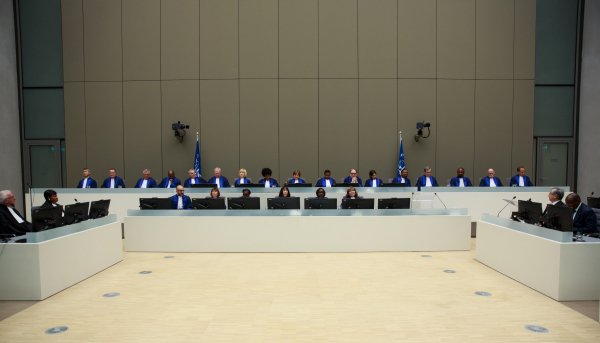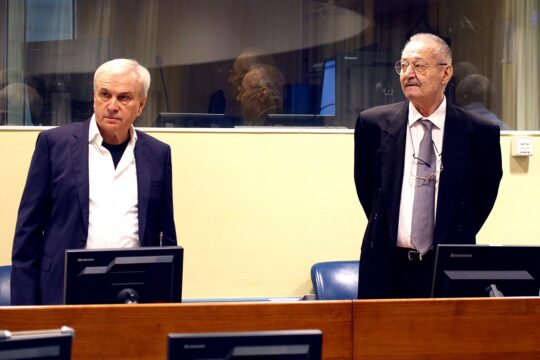International criminal justice puts forward the idea of universal, detached justice delivered by judges who are themselves completely independent and impartial because they are not part of the reality of societies at war whose crimes they judge. But the practices of the United Nations, international and mixed tribunals are questionable in terms of this ideal of justice.
The blindfold on the eyes of Justice is a symbol of impartiality. It signifies that justice is (or should be) delivered objectively, without fear or favour, independently of the identity, power or weakness of the accused persons: justice, like impartiality, is blind. This presupposition is strongly affirmed by the UN, which has put in place specific procedures to choose international judges. A Commission of experts composed of a majority of former international judges examines new candidates to ensure the morality, independence and impartiality of these men and women. In the case of the International Criminal Court (ICC), the judges are nominated by the States, but in other international jurisdictions they can also be nominated by “eminent persons”. The selected candidates are then interviewed behind closed doors by an ad hoc committee of three people, and judged according to their skills, independence and moral uprightness, independently of race, ethnicity or religion. This stateless justice claims to be fundamentally universal and impartial.
A closer look nevertheless reveals a much more nuanced image of the judges’ selection. The first set of judges of the International Criminal Tribunal for the former Yugoslavia did not include any judge from the Orthodox or Muslim religions, as if their religion might taint their impartiality and independence in terms of the way the UN sees public perception of impartiality and independence. Strangely, four of the ICTY judges were from countries with big Muslim populations, but the Egyptian was Copt, the Pakistani Zoroastrian, the Malaysian Buddhist and the Nigerian Christian. At the Special Tribunal for Lebanon (STL), which is a mixed Lebanese-UN court, the Lebanese authorities selected the judges according to community quotas (Christian, Shia and Sunni), which again is far from the dictates of international law. As we mentioned in a previous article, Swiss judge Robert Roth was forced to resign because, in the eyes of the court president, the fact his wife is Jewish could taint public perception of an independent, impartial tribunal charged with prosecuting crimes in Lebanon.
Can a judge really be detached?
In reality, the international courts are caught in a contradiction. They are subject to constant tension. Their very essence rests on the idea of universal, detached justice. But is it possible for a judge to be in a position of radical exteriority? Recurrent criticisms in Africa that the ICC is neo-colonialist also reflect the fact that the law imposed by colonial powers in the 19th century was designed to consolidate, justify and organize European domination. As the saying goes, justice must not only be done but must be seen to be done. This implies that the perception of the concerned populations is a central concern. If the work of the international tribunals is not “owned” by the societies most affected, they lose their moral authority, their real and symbolic effectiveness and, at the end of the day, their reason to exist.
But up to what point should public perception of justice be taken into account?
Where should the line be drawn without falling into a hysterical debate about the current or past origins of judges, their spouses or other members of their family? Should these perceptions be combatted in the name of respecting the norms of international law or, on the other hand, should they be embraced, with the risk that they end up leading to a withdrawal into community origins, where judges are labelled according to their origins? United Nations practice has been to preach a norm without ever putting it into practice. The UN, without ever recognizing it, has tried to reconcile two contradictory objectives, namely respect for the rules of International Humanitarian Law and how it sees perception of a court by the population. The tension provoked by these two contradictory objectives has led to an unsatisfactory – because arbitrary – situation, which reflects both the impossibility of completely detached justice and the risk of withdrawal into identity and negation of the very idea of justice.
Navigating two pitfalls
In its work, the UN and international courts have thus had to navigate for better or for worse between these two pitfalls. The ICTY selected judges who knew very little about the Balkans, with the risk that they lack the tools to lead the cases of which they were in charge. The International Criminal Court (ICC) faces the same challenge today. It is difficult for European or Asian judges to understand the complexities of Central African society or how communities in the western DRC provinces of the Kivus operate, how armed groups were formed, their organization and command structure, what scope the police and army have. It was to respond to this need and make justice more relevant to local populations that mixed or hybrid courts were created from the end of the 1990s, notably in Cambodia, Sierra Leone, Bosnia Herzegovina and Lebanon, with the risk – sometimes a reality – that these hybrid tribunals pay a political price for being in the country concerned.
From this point of view, the experience of international criminal justice in the Balkans holds a lot of lessons. The ICTY proved unable to sanction the perpetrators of crimes committed by the UCK Albanian rebels because information from the tribunal leaked out too quickly and intimidated witnesses withdrew from trials. And so, under pressure from the United States and the European Union, a special tribunal was set up to judge the perpetrators of war crimes. It is officially part of Kosovo’s judicial system but is based in The Hague, presided by a Bulgarian judge and with an American prosecutor. This complicated formula is designed to square the circle: create a tribunal for Kosovo without Kosovars, for fear that it be infiltrated and manipulated by elements linked to the former rebels, so as to deliver justice to victims of the UCK. Given that ICTY justice from outside the country failed, does a mixed Kosovo tribunal without Kosovars have more chance of success? The challenges for international justice are only just beginning…







